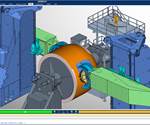Addcomposites introduces plug & play AFP/ATL for cost-effective composites manufacturing
New AFP-XS turns any robotic arm into an automated composites manufacturing system.
Addcomposites is a research project startup from Aalto University, Finland specializing in an accessible automated composite manufacturing system. It has developed a plug-n-play solution called AFP-XS for automated fiber placement (AFP)/automated tape laying (ATL) processes, that mounts onto any existing robotic arm. The compact and lightweight tool is available by subscription for a few thousand euro per month. By developing every subsystem, control and software element in-house, Addcomposites provides the lowest cost to consumers while maintaining aerospace-grade quality.
This cost and performance allows manufacturers to simply rent the toolhead for their facility and convert already purchased robotic arms into a high-quality ATL/AFP system. The AFP-XS system works with dry fiber, thermoset prepreg and low-temperature thermoplastic composite tape, producing lightweight, complex-shaped structures that are optimized for load-carrying and efficiency.
Addcomposites was started as a research project in 2017 with the goal to combine all the necessary steps of AFP — i.e., fiber feed, tape cutting, impregnation and placement — into one single step. Its initial offering, AFP-XS, is the first step in that direction.
Addcomposites is currently based in the European Space Agency Business Incubator Center (ESA-BIC, Espoo, Finland) outside of Helsinki, and is conducting pilot production trials with new space companies to validate the technology for a variety of applications. The company is supported by an ESA-BIC grant and ESA-BIC customers, but will close its seed round funding by early Q4 2019.
Addcomposites has just completed a composite manufacturing automation project with the largest composite manufacturer in Finland and is preparing for the commercial launch of its AFP-XS tool by 4Q 2019. Further system features will be revealed closer to this launch.
Read more in “Increasing access to AFP.”
Related Content
-
TU Munich develops cuboidal conformable tanks using carbon fiber composites for increased hydrogen storage
Flat tank enabling standard platform for BEV and FCEV uses thermoplastic and thermoset composites, overwrapped skeleton design in pursuit of 25% more H2 storage.
-
Rocket Lab begins installation of large AFP machine for rocket production
The 99-ton AFP machine, custom-designed and built by Electroimpact, is claimed to be the largest of its kind, expecting to save around 150,000 manufacturing hours in the Neutron rocket’s production process.
-
Recycling end-of-life composite parts: New methods, markets
From infrastructure solutions to consumer products, Polish recycler Anmet and Netherlands-based researchers are developing new methods for repurposing wind turbine blades and other composite parts.
















